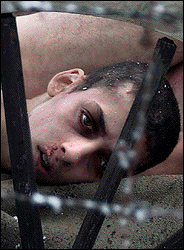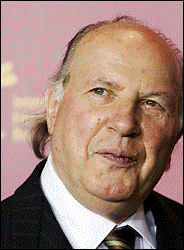By ALAN RIDING
BERLIN, Dec. 29, 2005 - Sixty
years ago, Imre Kertész emerged as an emaciated
Jewish teenager from the Nazi concentration camp at
Buchenwald. Thirty years later, he relived his
deportation, imprisonment and survival in a novel called
"Fateless." Now, at 76, the amiable Hungarian finds
himself revisiting the experience as the writer of the
script for a movie, also "Fateless."
"How can you not be touched by
seeing your own story?" asked Mr. Kertész, who won
the 2002 Nobel prize for literature. "I think the film is
very beautiful, but it is not the book. The film is a
visual thing. The child awakens immediate sympathy. The
text should play a secondary role to the action and
images."
|

|
|
|
Marcell
Nagy in "Fateless," which It is based on Imre
Kertész's semiautobiographical novel.
[ThinkFilm]
|
The notion of a "beautiful"
Holocaust movie may seem as strange as the homesickness
that Mr. Kertész recalled feeling for camp life
when he returned to Budapest in July 1945. But "Fateless"
is not a chronicle of the Holocaust as such. Rather, it
is a coming-of-age story set amid humanity's
ever-repeating cycles of barbarism.
The story has haunted much
of Mr. Kertész's writing. And as author of the
screenplay for Lajos Koltai's movie adaptation, which
opens Friday at the Film Forum in New York, he is once
again wrestling with these memories. He has condensed
some scenes from the book, replaced most first-person
narrative with visual metaphors and even added a couple
of scenes.
"The film is more
autobiographical than the book," he said in an interview
at his Berlin home, where his wife, Magda, volunteered to
interpret his Hungarian. "I'm not even sure if I wrote
the screenplay from memories or from memories of the
book."
Either way, the movie
retains the dreamlike quality of the novel, recently
published in a new English translation as "Fatelessness"
(Vintage). And it is this quality that most distinguishes
Mr. Kertész's very personal account of surviving
the Holocaust. "The film had to try very hard to avoid
Holocaust clichés," Mr. Kertész said. "It
could be emotional, but never sentimental."
In the novel, the story is
recounted by Gyuri Köves, who is 14 in June 1944
when he is taken off a crowded bus in Budapest and
deported with hundreds of other Jews to the Auschwitz
death camp in Poland. In the movie, the story is seen
mainly through the eyes of Gyuri, played by Marcell Nagy.
In both cases, the plot advances in an almost
matter-of-fact way.
|

|
|
|
Imre
Kertész wrote "Fateless" as a novel, and
adapted it as a
screenplay.
[Jochen
Luebke/Agence France-Presse - Getty
Image]
|
Arriving in Auschwitz, Gyuri
is told by other deportees to give his age as 16, a lie
that saves him from immediate death. Three days later, he
is sent to Buchenwald and subsequently to a labor camp at
Zeitz, also in Germany. The months that follow are
accompanied by fear, hunger, abuse and freezing
temperatures, but also by moments of solidarity among the
prisoners.
This solidarity saves
Gyuri's life. Close to starvation, unable to work because
of a badly injured knee, he is rescued from among the
dying by political prisoners who enjoy privileges denied
to Jews, including medical treatment. Gyuri is in the
Buchenwald camp clinic - where the doctors are also
prisoners - when American troops arrive.
In a scene not included in
the novel, an American army officer, himself Jewish,
encourages Gyuri to migrate to the United States, but the
boy wants to return to his family in Budapest.
"The officer is a composite
of various Americans who said the same thing," Mr.
Kertész explained. "For everyone, it was an
important decision whether to return home or go somewhere
else. Those who had an idea there would be socialism in
Hungary did not go back. I couldn't imagine going
anywhere except home. I was like a stray dog."
But home was not as Mr.
Kertész - or Gyuri - imagined it: his father had
died in Mathausen, a Nazi labor camp in Austria; his
stepmother had remarried; his home had been occupied by
another family.
Even here, Gyuri cannot
grasp that more than half a million Hungarian Jews have
died in the Holocaust; when asked about the atrocities in
the camps, he remembers his happiness.
"Yes," the novel concludes
in Gyuri's voice, "the next time I am asked, I ought to
speak about that, the happiness of the concentration
camps. If indeed I am asked. And provided I myself don't
forget."
If "happiness" in such
circumstances still shocks, that was the author's
intention. "I took the word out of its everyday context
and made it seem scandalous," Mr. Kertész said.
"It was an act of rebellion against the role of victim
which society had assigned me. It was a way of assuming
responsibility, of defining my own fate."
Still, by the time the
novel was published in 1975, Mr. Kertész was 45
and trapped in a different kind of camp, Hungary's
Communist regime. And "Fateless" was largely ignored.
Having lived off writing librettos for musical comedies,
Mr. Kertész turned to translating German classics
into Hungarian and did not publish another novel until
1988.
Then, with the collapse of
the Soviet bloc, these and later novels were finally
published in German and other European languages. But in
Hungary, Mr. Kertész remained little read. In
fact, although as early as 2000 he began discussing a
screen adaptation of "Fateless" with Mr. Koltai, a
veteran cinematographer, financing was only forthcoming
after Mr. Kertész won the Nobel Prize in
Literature in October 2002.
Mr. Koltai said he and Mr.
Kertész agreed immediately to retell the story in
the same linear fashion as the novel, without flashbacks
or the use of archive images. "We did not want
sentimentality; we wanted to keep a distance," Mr. Koltai
said in a telephone interview from Budapest. "After Imre
had finished the screenplay, he said, 'I give you this as
a present, and then you give me the present back as a
film.' "
Costing $13 million, with
144 named roles and as many as 500 extras crowding a
specially built "concentration camp," "Fateless" is the
most expensive Hungarian film ever made. It is also this
year's most successful Hungarian film, as well as the
Hungarian entry for best foreign language film at the
2006 Academy Awards.
"What was most exciting is
that many teenagers went to see the movie in Hungary,"
Mr. Koltai said of the film, the first feature he has
directed. "They fall in love with the boy and realize
that his fate could be their fate: just taken off a bus.
It could happen to anyone anywhere in the world
today."
